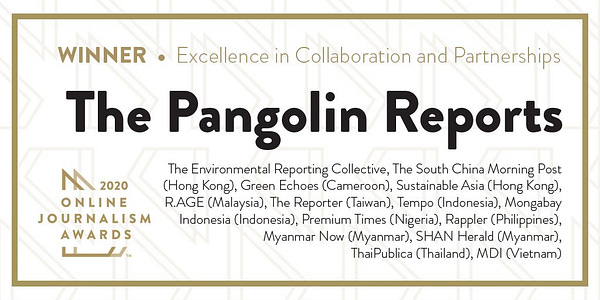Green Echoes #16 - Q&A with Lulu Ning Hui on reporting about Chinese seafarers
Key investigative stories, data sources, funding/training opportunities and our projects from across Asia.

Dear friends and supporters,
Welcome to Green Echoes, a newsletter from the Environmental Reporting Collective that highlights key investigative stories, data sources, funding, reporting and training opportunities and our projects from across Asia.
Q&A with Lulu Ning Hui, senior journalist and editor for Initium Media
An English translation of her in-depth feature on Chinese seafarers who fish on the high seas in the southwest Atlantic has just been translated and re-published by Chinarrative. It’s a great story, with personal perspectives and visual details that are rarely seen in fisheries reporting. In fact, Lulu boarded a Chinese fishing vessel drifting off the coast of Argentina, and interviewed Chinese shipping companies and local environmental NGOs, connecting fishermen, subsidies, transshipment, and other problems in the high sea fisheries.
Xu Jiaming, who manages 绿色回声, our Chinese-language newsletter, interviewed Lulu earlier this year, and we’ve translated part of the interview for you below (the full version is available on our website here.)
Jiaming: How did you conduct reporting involving multiple countries, NGOs and industry insiders? Are there any good tools, techniques, and strategies worth sharing? What challenges did you encounter and how did you overcome them?
The opportunity for this came from my previous reporting on The opportunity for this came from my previous reporting on a Chinese investment in Madagascar's fishing sector (see an English version here: Madagascar rocked by fishing deal that never was). Greenpeace invited me to go to sea with them. Their research ship often invites scientists, reporters and even opinion leaders or celebrities to participate in research activities. This time, there were also reporters from several other countries invited. We boarded Greenpeace’s ship “Esperanza” and came to the fishing grounds on the high sea outside the EEZ of Argentina.
When we met the Chinese fishing ship in the story, we first communicated by radio, had a friendly chat in Chinese, and then were allowed to board. In fact, the actual interview time on the ship was only about half an hour.
The charm of on-site interviews lies in “chance”. You can't "plan" the interview. The last ship in the article, including the Chinese businessman who was running the shipping agency business in Uruguay, I ran into it accidentally.
Are there plans to do follow-up reporting? Or suggestions to other colleagues interested in fishery and overfishing?
I hope so. I think there are a few points that reporters could pay attention to: First, the situation of fishermen, young people who are now unwilling to go to sea, how fishing villages and ports are facing transformation. China has also promised to stabilize the number of ocean fishing vessels at 3,000. What is the impact of this on people? Second, there is the issue of offshore fishery subsidies; where does the money come from, where it is spent, and are there any reforms? Third, in international negotiations on high seas resources, not only fisheries, but also mining, genetics, etc., what kind of role is China playing?
Do you have any advice for other journalists, especially to Chinese reporters, looking to embark on a similar cross-border investigation?
When encountering topics that require cross-border reporting, international cooperation is natural. When it works out well, there’s always very warm trust and shared respect among journalists involved. It’s essential.
Opportunities and clues are generated from long-term attention. In my case, what I call “China outside China” has been my long-term focus. In fact, environmental issues are not my only focus, but when we look at China’s influence in the world, stories on environmental impacts are a very important part of it. It’s also because they tend to draw more attention. I try to focus on stories with much less media exposure too, or I would look into projects before the damage is done -- how are they approved to begin with.
The best reporting from across Asia
In South Asia, air pollution is worsening both due to the lessening of Covid-19 restrictions, but also the advent of winter. In this in-depth piece, Soumya Sarkar, Zofeen Ebrahim and Ramesh Bhushal use data to explore the potential public health risks of air pollution and the pandemic for The Third Pole.
In Indonesia, a recently passed deregulation law could harm coastal communities - and the more than 800,000 fishers across the archipelago, reports Basten Gokkon for Mongabay.
For Oxpeckers, Yuexuan Chen reports on traditional Chinese medicine, speaking to qualified practitioners about why they are against the use of wildlife based medicines, the impact of COVID-19, and how the industry is perceived in western media.
Data, Resources and Training
Data Inspiration: Forest, peat, and brush fires have been a big story in 2020. If you’re looking for data on current fires, or potential future hot spots, check out NASA’s Global Fire WEather Database (GFWED), which integrates different weather factors influencing the likelihood of a fire starting and spreading.
Opportunities: Solutions Journalism Network has launched a Talent Network aimed at connecting freelance journalists to editors. Learn more and sign up here.
Also - the Earth Journalism Network is looking for regional researchers in at least six countries, mostly in South and Southeast. Learn more and apply here (Deadline October 27).
One interesting upcoming webinar on October 22 entitled State of Play: Green Recovery and Sustainable Reporting.
That’s all for this week. Anything we missed or that you’d like to see here? Want to pitch us a story? Please respond and let me know.
Stay safe and healthy,
Nithin Coca
PS. The Pangolin Reports won another award!



The Environmental Reporting Collective is a group of reporters and editors across Asia and elsewhere, working together to rethink how environmental journalism is done. We support collaborative journalism projects that start new conversations on how our societies impact our planet. Such stories are complex and expensive. That’s why they require new approaches to research, reporting, editing and distribution.
To learn more about our work, check out our website, Investigative.Earth, and follow us on Twitter and Facebook. You can also let us know what you would like to see in this newsletter by responding to this email.


